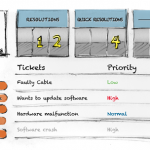 Spanish telecoms company Movistar has seven call centers spread throughout Latin America, with over 3,000 active agents. To optimize the performance of those agents, the company wanted a single platform that would enable them both to ensure their skills were up to date, and also to allow performance to be compared between agents.
Spanish telecoms company Movistar has seven call centers spread throughout Latin America, with over 3,000 active agents. To optimize the performance of those agents, the company wanted a single platform that would enable them both to ensure their skills were up to date, and also to allow performance to be compared between agents.
This has led to the creation of a new software platform to monitor and track agent performance. The platform, launched in 2012, allowed Movistar to see concrete results across sales teams and call centers. Central to this success was the use of gamification within the platform.
‘’Thanks to the use of the social collaboration tools and use of Gamification techniques, we have helped Movistar consolidate and unify their formation processes with 7 call center providers in 3 countries,’’ comments Oscar Giraldo, Co-Founder and CEO of PlayVox, who developed the software for Movistar.
Movistar have found that applying gamification to all elements of their internal social network, they have been able to achieve higher motivation levels from users, whilst engagement has significantly increased.
‘’We have been able to demonstrate the exchange of good practices among participants, who have shared their experiences at a personal and professional level, a situation that would not have been possible without this tool,’’ says Paola Parodi, Chief Training with Movistar.
If you’d like to deploy your own gamification program, Wharton professor, and gamification expert, Kevin Werbach may have some tips to help you. In his gamification course on Coursera recently, he outlined 8 key components for any successful gamification effort. They may help to guide developers in the successful addition of games to what is a serious and erstwhile project.
8 keys to workplace gamification
- Problem solving. We’re hard-wired to enjoy a challenge, and it is often the routine and un-challenging nature of work that makes it dull. Stretching yourself however can be incredibly rewarding.
- Exploration. This desire to solve problems often leads us to attempt new things and requires us to learn new skills in order to solve each problem. This sense of exploration is an inherently rewarding experience.
- Teamwork. The massive multiplayer environments of modern games should show managers how much people like working together to crack a problem. We are often natural collaborators, so you should use all the tools at your disposal to encourage this.
- Recognition. Research a few years ago showed that people value recognition and appreciation more than sex. A simple thank you can raise employee engagement by as much as 30%.
- Success. Back in 2011 Harvard academic Teresa Amabile released The Progress Principle. The book charts the importance of achieving success, or at least making progress, and its impact on our happiness in life and at work.
- Surprise and novelty. Relationship gurus the world over trumpet the virtue of keeping things fresh in a relationship. Novelty is kinda taken for granted in the social world because it moves so quickly, but introducing fresh things should be a key part of your working life.
- Creativity. How often do you get to come up with great ideas at work? I suspect when you think of those times, it was generally accompanied by a happy feeling. Just as challenging work is exciting, so is trying new ways of succeeding at work.
- Knowledge sharing. If you’re regarded as an expert in your field, it does wonders for your ego. The culture of hoarding knowledge and using that power to climb the greasy pole is hopefully slowly fading out, so get out there and show off your knowledge internally. There are lots of collaboration tools available now that encourage internal knowledge sharing. The chances are your organisation has one in place, so get out there and make use of it.
Originally posted at Work.com